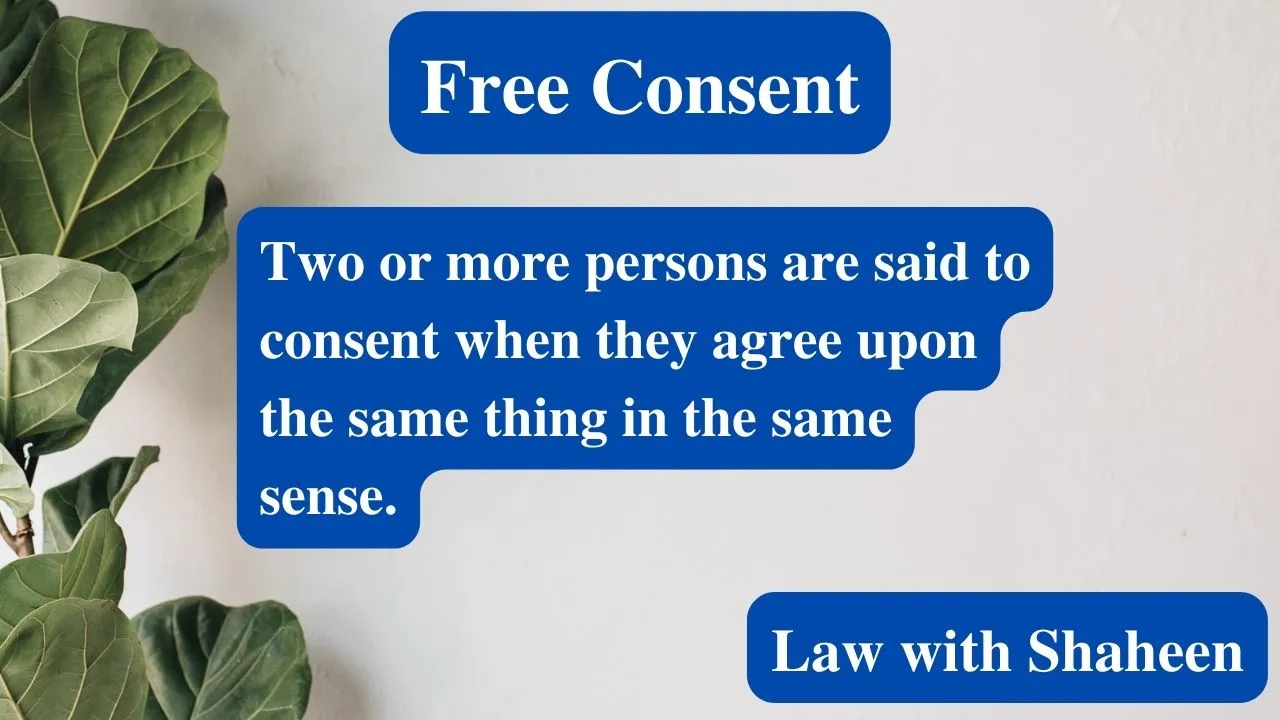Table of Contents
Introduction to Consent:
Section 10 of the Contract Act, of 1872 lays down the essentials of a valid agreement, where it says that for an agreement to be valid, it should have been caused by the free consent of the parties.
Relevant Provisions:
Sections 13, 14, 19, and 20 of the Contract Act, 1872.
Meaning of Consent:
Consent means;
“Agreement, approval or permission as to some actor purpose, especially given voluntarily by a competent person.”
According to Black’s Law Dictionary;
“Consent is an act of reason, accompanied with deliberation the mind weighing as in a balance the good or evil on each side.”
Definition of Consent:
According to Section 13 of the Contract Act, of 1872:
“Two or more persons are said to consent when they agree upon the same thing in the same sense.”
Explanation:
Consent involves a meeting of minds or consensus ad idem. If the parties are not ad idem on the subject matter about which they are negotiating, there is no agreement between them. When the minds of the parties are directed to different objects, or they attach different meanings to the language that they use, it is obvious that there is no real consent and hence no contract.
Example:
A, who owns two Honda Cars, offers to sell one car “City” to B for Rs. 800000/- agrees to buy the car thinking A is selling car ” Civic”. A and B have agreed not to do the same thing in the same sense but to do different things. There is no consent and hence no contract.
Meaning of Free Consent:
According to Black’s Law Dictionary:
“Free consent means a voluntary agreement by a person in the possession and exercise of sufficient mental capacity to make an intelligent choice to do something proposed by another”.
Definition of Free Consent:
(i) According to Section 14 of the Contract Act, 1872:
An agreement is said to be free when it is not caused by coercion, undue influence, fraud, misrepresentation, or mistake. Consent is said to be so caused when it would not have been given but for the existence of such coercion, undue influence, fraud, misrepresentation, or mistake.
(ii) In Simple Words Definition:
Free consent is consent that has been obtained by the free will of the parties, voluntarily given, out of their own accord and no pressure is used on either of the contracting parties in the form of coercion, misrepresentation, fraud, undue influence, etc.
Legal Effects:
Not only consent but free consent is declared by Section 10 to be necessary for the complete validity of a contract. Section 10 states that where there is no consent or no real and certain object of consent, there can be no consent at all. Where there is consent, but not free, there is generally a contract voidable at the option of the party whose consent was not free.
Generally, following legal effects flow from agreements made without free consent.
(a) Section 19 of the Contract Act, of 1872, states:
When consent to an agreement is caused by coercion, fraud, or misrepresentation, the agreement is a contract voidable at the option of the party whose consent was so caused.
(b) Section 19(a) of the Contract Act, 1872, states:
When consent to an agreement is caused by undue influence, the agreement is a contract voidable at the option of the party whose consent was so caused
(c) Section 20 of the Contract Act, of 1872, states:
Where both parties to an agreement are under a mistake essential to the agreement, the agreement is void, and it is not enforceable at the option of either party. So when there is no consent there is no contract.
UN-FREE CONSENT Un-free Consent:
Consent is said to be un-free consent when it is caused by;
| (i) Coercion | (ii) Undue Influence, |
| (iii) ) Fraud | (iv) Misrepresentation |
| (V) Mistake |
To conclude consent is the backbone of a contract. For a valid contract, there must be free consent. Where there is no consent, there is no contract, and where there is consent, but not free consent. There is generally a contract voidable at the option of the party whose consent was not free.
